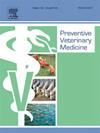Small pig stakeholders' knowledge of foreign animal diseases: Baseline knowledge and impact of an outreach session
IF 2.4
2区 农林科学
Q1 VETERINARY SCIENCES
引用次数: 0
Abstract
The emergence and rapid spread of Foreign Animal Diseases (FADs) pose ongoing threats to animal and human health. Specifically, the swine industry faces constant risks of disease introduction, with African Swine Fever among the foremost concerns. Despite numerous national and local initiatives aimed at supporting swine stakeholders in FAD preparedness, the focus has predominantly been on large commercial operations, neglecting small-scale stakeholders. This study aimed to assess baseline knowledge and evaluate the effectiveness of an outreach session within small swine stakeholders in the state of Ohio, United States. Utilizing pre- and post-session surveys, we measured changes in short-term knowledge levels among 31 participants across five sessions. Results indicated a significant improvement in participants' knowledge post-session regarding various aspects of FADs recognition, transmission, and outbreak response. Additionally, our analysis identified educational level as the sole factor significantly associated with higher pre-session knowledge levels. These findings highlight the potential of outreach programs designed for small-scale stakeholders to improve biosecurity practices and FAD preparedness.
小猪利益相关者对外国动物疾病的知识:基础知识和外联会议的影响
外来动物疫病的出现和迅速传播对动物和人类健康构成持续威胁。具体来说,养猪业面临着疾病传入的持续风险,非洲猪瘟是最令人担忧的问题之一。尽管有许多国家和地方举措旨在支持养猪利益相关者做好FAD的准备,但重点主要集中在大型商业经营上,忽视了小规模利益相关者。本研究旨在评估基线知识,并评估美国俄亥俄州小型猪利益相关者外展会议的有效性。利用课前和课后的调查,我们测量了31名参与者在五个课前的短期知识水平的变化。结果表明,参与者在会议后对FADs识别、传播和爆发反应的各个方面的知识有了显着改善。此外,我们的分析确定教育水平是与较高的会前知识水平显著相关的唯一因素。这些发现突出了为小规模利益攸关方设计的推广方案在改进生物安全实践和FAD准备方面的潜力。
本文章由计算机程序翻译,如有差异,请以英文原文为准。
求助全文
约1分钟内获得全文
求助全文
来源期刊

Preventive veterinary medicine
农林科学-兽医学
CiteScore
5.60
自引率
7.70%
发文量
184
审稿时长
3 months
期刊介绍:
Preventive Veterinary Medicine is one of the leading international resources for scientific reports on animal health programs and preventive veterinary medicine. The journal follows the guidelines for standardizing and strengthening the reporting of biomedical research which are available from the CONSORT, MOOSE, PRISMA, REFLECT, STARD, and STROBE statements. The journal focuses on:
Epidemiology of health events relevant to domestic and wild animals;
Economic impacts of epidemic and endemic animal and zoonotic diseases;
Latest methods and approaches in veterinary epidemiology;
Disease and infection control or eradication measures;
The "One Health" concept and the relationships between veterinary medicine, human health, animal-production systems, and the environment;
Development of new techniques in surveillance systems and diagnosis;
Evaluation and control of diseases in animal populations.
 求助内容:
求助内容: 应助结果提醒方式:
应助结果提醒方式:


